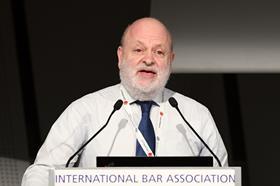I have just come back from the International Bar Association (IBA) annual conference in Paris.

I am still alert for the sign of creepy crawlies and red bites, but it seems that, despite taking the train there and back, plus public transport to get about Paris, and sleeping in an actual bed in an actual Paris hotel, I have emerged free of bed-bugs. Sightings of mattresses and other furniture put out in the street on my walk to the congress centre persuaded me that their existence is not just a Russian disinformation campaign.
The conference is a vast affair of thousands of lawyers, which works because those lawyers have decided to make it work. The technical sessions put on by the committees are not attended by thousands. It would be interesting to know how many register for the conference itself, and how many turn up in Paris for the networking. If you go to the smart hotels throughout the day, you see the lobbies filled with lawyers talking to each other in pre-arranged meetings between law firms. The conference rooms are emptier.
Nevertheless, what went on during the week reflected the outside world remarkably accurately, touching on AI, the Israel-Hamas war and London’s place as the global legal centre.
So while the White House issued an executive order on safe, secure and trustworthy AI, and the UK government held its AI Safety Summit, AI was also probably the most discussed topic at the conference, at least in the meetings and sessions I attended.
While our prime minister embarrassed himself in his fan-fawning with Elon Musk, the Law Society’s chief executive ran a more dignified interview with an IT guru.
And while our government is still trying to find the line between not stifling innovation but clamping down on dangers, lawyers seem equally confused about the impact of AI. AI is such a huge technology that many seem overwhelmed, and don’t know where to start. Discussions ran off in many directions without structure.
I have three principles, which I tried to yell above the din:
- distinguish between AI provided under the control of a lawyer, and AI providing legal services autonomously (through generative AI, for example);
- where AI is being provided under the control of a lawyer, there is little problem – current ethical principles apply, although bars should issue guidance;
- where AI is providing legal services autonomously, bars need urgently to bring the risk to the attention of their governments, so that it can be considered before risk-based legislation is introduced.
But others had their own concerns, and there was never time to come to a consensus. My advice is: don’t be overwhelmed, begin with the manageable.
As for the Israel-Hamas war, the IBA’s Human Rights Institute (IBAHRI) called towards the end of the conference for an immediate ceasefire. The IBA itself issued a statement shortly after the war began, but put out this second statement in the name of its Human Rights Institute, which is described as ‘an autonomous and financially independent entity’, despite sharing branding and a website with the IBA. Does this shift accountability for the statement?
I am not getting into the ins and outs of a horrible, tangled conflict, causing so much pain and death, but to call for an immediate ceasefire at present is seen by many (including the US government) as favouring one side. I give no view as to whether that is right or wrong, but I do believe, as I said before, that bars and other legal professional organisations should not issue such statements when they do not directly concern the legal profession.
London as the global legal centre was foreshadowed on the Monday of the conference by the Law Society’s launch of its International Data Insights Report 2023 on the Global Position of English Law. This contains remarkably good news about the performance of our legal profession, seized on that evening at the Law Society’s IBA reception near the Place de la Concorde by our president, in his speech to a gathering of hundreds of international delegates.
There will be different views as to whether the Law Society should host a reception at such an event, but it gave our president the opportunity to highlight the benefits of our jurisdiction to lawyers from around the world.
Post-pandemic, one of my colleagues still wore a mask throughout the conference. Many delegates had coughs and colds. But I found it a great relief to meet up in person again.
Regardless of illness, there is a further looming problem for gatherings like this, also reflected in conference discussions. Climate change may well have been the second most popular topic after AI. The IBA’s business model is predicated on in-person meetings between lawyers travelling long distances from around the world. This is not climate-friendly. Will the IBA do anything about it?
Jonathan Goldsmith is Law Society Council member for EU & International, chair of the Law Society’s Policy & Regulatory Affairs Committee and a member of its board. All views expressed are personal and are not made in his capacity as a Law Society Council member, nor on behalf of the Law Society































1 Reader's comment